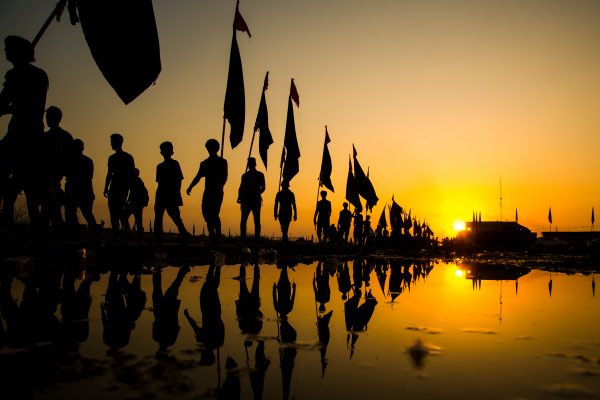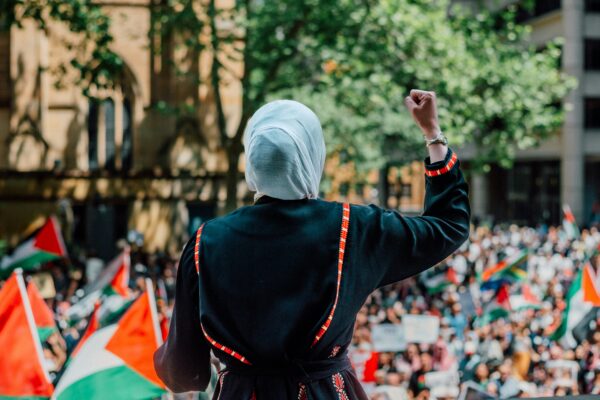As Muslim activists, despite the pressure we can often face, it is necessary that we remember the centrality of God in our work and the Quranic concept of justice.
As Muslim activists, despite the pressure we can often face, it is necessary that we remember the centrality of God in our work and the Quranic concept of justice.
We have collectively observed the rise in social injustices around the world, particularly in the United States. We have also observed many Muslims rising up and being present in the fight against injustice.
Various Muslim groups have frequently been seen laying the first stone and leading the way for others, and whilst activism is important and much needed now more than ever, we must ask ourselves: Is God always at the heart of our activism? This is a question every Muslim activist should habitually ask themselves.
The world is witnessing political injustices, economic injustices, racial injustices, and more, and it is paramount that as believers we understand that every cause we support and every campaign we advocate for must be done for God’s pleasure only. The Messenger of God and his family (peace and blessings be upon them) were manifestations of the Holy Qur’an, such that every stance they took, and every position they adopted was for the sake of God, and by following in their footsteps we should ensure God remains at the core of our activism.
In recent years, we have seen numerous movements birthed under the banner of social justice. While there have been some positive aspects to this (such as the much-needed discussions that have finally taken place in our sacred spaces), there is also a bleaker aspect that has gone unnoticed in some communities.
For example, in many instances, the immoral has been categorized as moral, and the sacred has been classified as profane, leading to several young Muslims feeling ever so perplexed and insecure in their beliefs – this also poses danger to future Muslim generations. As with everything, it should be remembered that we will be held accountable for every cause we support and every slogan we chant.
Therefore, to ensure our activism remains in line with our Islamic principles, we should frequently seek religious guidance from the clergy and experts in our communities. This will prevent us from adopting positions that contravene Islamic Law and also avert us from losing sight of our ultimate goal, God’s pleasure.
Further to this, it is crucial for any Muslim that is determined to bring about change to give attention to their spiritual state, for activism and spirituality must go hand-in-hand and our submission to God and God’s laws must be at the heart of all that we do. Without a doubt, activism without spirituality becomes ostentation.
In the book ‘Light within Me’, the great Allamah Tabatabai discusses the stages of one’s spiritual journey, and this contains a beautiful reminder for everyone, but more so for those involved in the arena of Islamic work and activism.
Allamah says: “It must be remembered that without being sincere in the way of Allah it is not possible to attain to spiritual stations and stages…There are two stages of sincerity: The first stage is of carrying out all religious injunctions for the sake of Allah only. The second stage is of devoting one’s entire self exclusively to Allah.”
It’s always important that we check our intentions, and ensure we remain sincere in our actions. When we become proud and the arrogance within us starts settling in, this is often an indication that we are not being sincere. It must be remembered that sincerity (إخلاص) must the foundation of everything we do in our lives, from worshipping God, to giving charity, to undertaking any virtuous deed.
In Surah Hud of the Holy Quran, Prophet Shuayb, who was known as the ‘orator of the Prophets’, calls the people to God whilst denouncing them for their economic corruption (verses 84-85). We see Prophet Shuayb compassionately remind the people of Madiyan of their responsibility to God first and foremost, and then their rights to the people.
He says: “O my people, worship God…” and then he tells them: “Do not give short measure and weight”. Throughout the verses, Prophet Shuayb beautifully intertwines the call for justice and fairness with the call towards Monotheism, reminding the people that God is merciful and insists on creating an economic structure that is fair.
To end, every school of thought in Islamic theology recognizes the importance of Enjoining Good and Forbidding Evil. This is a command from God, and in the Qur’an, we are told just how important this duty is (31:17). There is a level of diligence required to ensure our activism remains in accordance with our religious principles.
This includes making sure a cause we support isn’t a publicity stunt that will bring harm to our faith or the wider Muslim community, or a movement designed to weaken our divine laws. Of late, many groups under the guise of social justice have sought to normalize that which is antithetical to the religion of Islam, and unfortunately, many Muslim organizations and personalities have formed alliances with those groups.
When exploring activism from an Islamic paradigm, we have to understand what constitutes as ‘good’ and ‘evil’ in Islam. Although we may have the purest of intentions, we cannot enjoin good or forbid evil without recognizing what this means – this requires Muslim activists to dedicate more time to seeking knowledge and learning the basics of Islamic jurisprudence, not only will this strengthen our Islamic work, but also prevent us from [knowingly or unknowingly] violating God’s laws.
For example, over the last few years, several Muslims in the West have been actively supporting the LGBTQ+ lobby and endorsing their projects and causes. Whilst we can agree that no human being deserves to be harmed, this does not mean we must support and defend all that they stand for, especially anything that is specifically prohibited in Islam.
The ubiquity of moral relativism in this day and age has led to man dismissing his commitment to moral principles. While society has proven incapable of maintaining biological and spiritual paradigms, Islam’s morality remains absolute and it is clear what Islam says about homosexuality.
As Muslim activists, despite the pressure we can often face, it is necessary that we remember the centrality of God in our work and the Quranic concept of justice.





